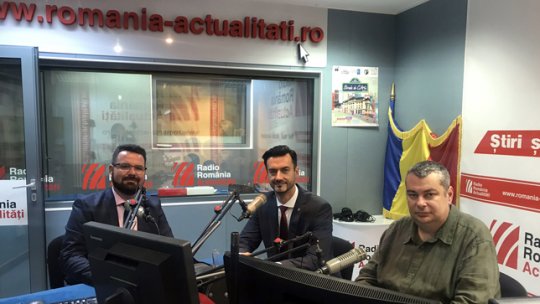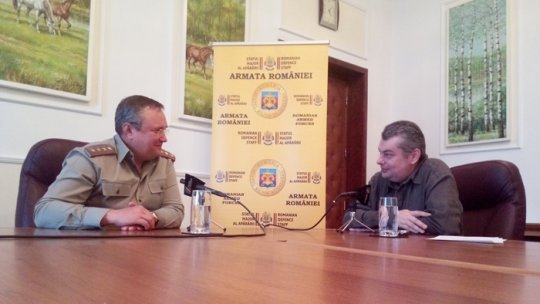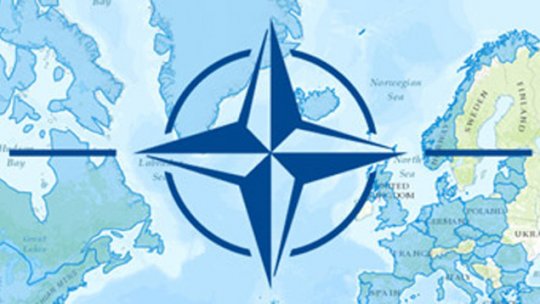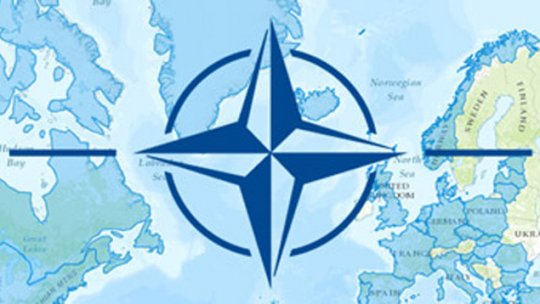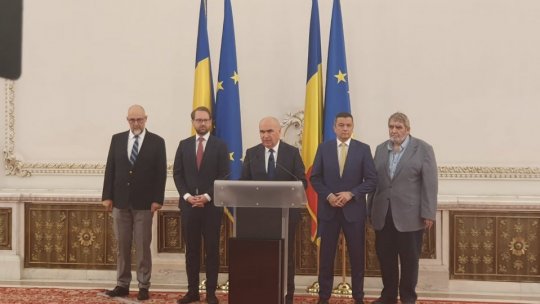EU Common Security and Defense Policy: Highlights
Main aspects of EU Common Security and Defense Policy (CSDP), which are extremely important for the future of the European security.
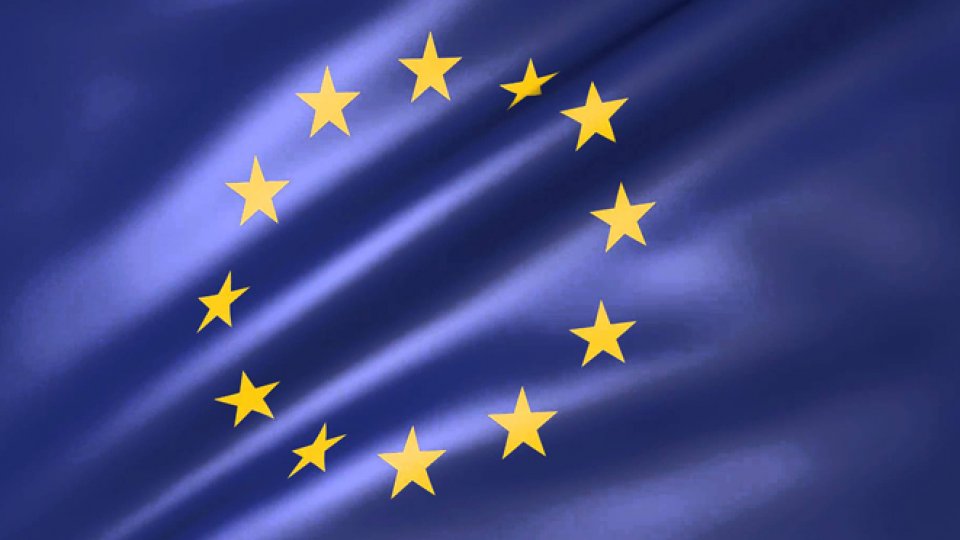
Articol de Radu Dobriţoiu, 23 Ianuarie 2019, 13:35
Radio Romania News Producer Radu Dobrițoiu, military reporter: Recent developments in the European Union have led to the theme of the latest "Euroatlantica" radio show of Radio Romania News, broadcasted on 18 January 2019. An important year start for Romania, that took over Presidency of the EU Council and a very important issue on the political scene in London where Brexit has just been rejected in UK’s House of Commons. We here highlight main aspects of EU Common Security and Defense Policy (CSDP), which are extremely important for the future of the European security, which will influence the medium and long-term geopolitical balance, starting from the European common defense project - PESCO, the still threatening immigration issue and the EU borders, the challenges of financial-banking developments, construction of new structures for energy resources, and a new approach for EU’s relationship with the United States. Special Guest of the edition - Liviu Mureșan, Executive President of EURISC Foundation. We also have three statements from Romanian Members of the European Parliament (MEPs), interviewed in Strasbourg by RRA Reporter Clementina Tudor. Current theme: "Highlights of EU Common Security and Defense Policy (CSDP)".
Radu Dobrițoiu: Mr.Mureșan, Romania’s EU Council Presidency will not be an easy one. Until March, the main legislative dossiers in reference to the European common defense project should also be completed. Exactly how important is this project?
Liviu Mureșan: There have been several attempts to find a solution for the European defense projects over the EU history, documents have been drafted, they were almost close to completion at certain times, but gradually there came this idea that eventually was accepted for a fact – that EU Member States that are also NATO members are the ones that should make efforts to form a European defense organization that should be credible, should act and offer these countries the chance to improve their collaboration on missions that are both in the European area and abroad. In this sense, NATO proved to be a reality, to which Romania also contributed significantly and we are glad that this year a review is being made. It remains to be seen what news we will have from the US Administration, NATO Secretary General Stoltenberg will be in Romania for important meetings on European defense, and it is a sign that this collaboration between NATO and the EU exists and it is welcome. I do hope that there will be no concrete plans of action following statements by some European leaders that Europe will build its own defense formula and abandon NATO, which proved to be the most important defense structure and where Romania had a special role to play.
Radu Dobrițoiu: Brexit file is getting complicated, and this is happening during the Romanian EU Council Presidency. London Parliament recently rejected agreement negotiated by Theresa May with the European Union. Romania must now prepare to administer the legislative procedures in the Council if ultimately the UK will leave the EU without a Brexit agreement. RRA Reporter Carmen Gavrilă on the impact of these decisions:
RRA Reporter Carmen Gavrilă: Romanian Foreign Minister Teodor Meleșcanu explained for Radio Romania that Bucharest and London have a strategic partnership and that there have already been talks to modify it in order to correspond to the future specific relationship between a Member State and a country outside the EU, including provisions on situation of Romanians living in the UK. Meanwhile, British Prime Minister Theresa May has recently prepared a proposal for the European Union, after House of Commons rejected the agreement with Brussels in the form negotiated for two years, and the British Prime Minister wants consultations with leaders of the parliamentary parties, after being constantly accused of ignoring UK legislature during negotiations with the EU. Meanwhile, main European institutions have reported that they awaited an official UK stance on how the Kingdom will leave the Union, but have firmly pointed out that there is no room for a renegotiation of the vote that has already been adopted by the Member States. In essence, now each party expects the other to back down, under the ever-increasing pressure of March 29, set for Brexit.
Radu Dobrițoiu: Mr. Mureșan, a new plan is expected, Brexit is getting complicated. What impact will this have on EU's common security?
Liviu Mureșan: We first have to see what the final formula will be, but in any case, in the meetings we had at the end of last year in Brussels, discussions with colleagues from other countries who have been dealing over time with problems of security and defense, worry is justified because the UK has played an important role in these European structures. It is a country with a great defense experience, ranging from research, production, and missions that have been executed outside ...
Radu Dobriţoiu: Expeditionary forces.
Liviu Mureşan: Exactly ...
Radu Dobrițoiu: Intelligence.
Liviu Mureșan: That's right. And an opportunity for close collaboration with Romania, especially in the field you mentioned. So in this sense, the absence of Great Britain will create a whole series of problems. What is also a sign of concern is that some members of the European Union regard this UK departure as a chance to fill in the remaining free area ...
Radu Dobrițoiu: We look at France, first of all.
Liviu Mureșan: France too, and not only to take over responsibilities left free, but it is the interest of the defense industry. We are talking about contracts, funds that will be used with a smaller number of participants. For Romania, leaving Britain, in one form or another, will really be a waste. We have had a very good collaboration with this country and, as we have been discussing on various occasions, our work within the Alliance, the continued presence of the United Kingdom in the Alliance provides Romania with a continuation of good bilateral relations and even a deepening of them. It is one thing that must concern us all: what will happen to the North Atlantic Alliance? Criticisms made by the American administration on those founding members of the EU that have not sufficiently committed themselves to the modernization efforts and the current activities of NATO - are justified. Let's see to what extent this formula suggested by the President of the United States, with greater involvement, a greater contribution from member countries, will find the right answer. November 11 is an indicator on when it is said that we need a European defense, to defend ourselves from Russia, China and even from the United States. This is not a starting point for a long-term collaboration.
Radu Dobrițoiu: Of course. We see this transatlantic relationship in a highly effervescent dynamic during the current Washington administration. EU borders are extremely important, especially considering as highly possible that EU confronts again with new waves of migrants. RRA Reporter Clementina Tudor interviewed MEP Norica Nicolai in Starsbourg, on this subject:
MEP Norica Nicolai: We (Romania, n.a.) are a real border of the European Union. The fact that Romania is not in Schengen does not necessarily create new big problems for Bucharest, but it will create big problems for the European Union, because the Black Sea and the Middle East are areas that are fluid in terms of security. Let us not forget that Turkey has a major frustration of being held for over 20 years on the European Union’s doorstep. Erdogan (..) accepts billions from the EU to keep the migrants, but what will we do when the Union no longer has these billions to give him? We have to think, the situation in Syria, Iraq is not one that can make us optimistic, we will continue to face migratory flows. Summer comes and this is what is going to happen. So the security zone of the European Union's eastern border is totally without the support of some who certainly need a security space, but are only trying to promote their interests and not everyone's interests.
Radu Dobrițoiu: MEP Norica Nicolai on Schengen. Let us remember the so-called “military Schengen”, which is very important for the mobility of troops in case of special situations, Mr. Mureșan.
Liviu Mureșan: A series of military exercises, with the presence of European forces, as well as of colleagues in the US, have been justified over the last period. It has been proven once again that a formula is needed to reach this mobility which is essential for the success of operations. Exercises involving tens of thousands of soldiers from different countries were welcomed, they had results. Meanwhile, on the other side, to the east, the Russian Federation has done drills involving a much higher number of staff, hundreds of thousands, and let’s not forget the infrastructure it benefited from. It is then justified to place on the agenda, as a priority, construction of infrastructure sections from the Baltic to the Black Sea and Mediterranean, on which these troop movements, equipment and so on can operate. In this regard, Three Seas Initiative and other things are welcome, but they are still theory. On the military level, there has to be an agenda with priorities in this regard.
Radu Dobrițoiu: Would it also be an reason for Romania to be accepted more quickly in the Schengen area?
Liviu Mureșan: Despite efforts we have made so far in the relationship (..) with the US, first of all, we see that we have not yet obtained the visas from our strategic partners, although we have collaborated in various theaters of operations, we had and still have an excellent collaboration. At the same time, our European partners have forgotten the efforts we have made and, indeed, recognition that at technical level we are absolutely compatible. I believe that the new security environment and all the challenges that arise this year, as they are seen now in January, are forcing some countries which are rather reserved - subject of criticism from EC President Juncker in this respect - to reconsider their positions and to give Romania and Bulgaria the chance they have been waiting for, a long time.
Radu Dobriţoiu: Especially that Romania, as Mrs Nicolai said, is situated at the EU border and the security borders.
Liviu Mureșan: This is where the security environment is reconfigured, taking into account the Russian Federation's growing activities in the Black Sea area, in connection with Turkey's slightly predictable developments. Migratory flow that Mrs Nicolai reminded of is a problem which unfortunately the European Union has not taken seriously enough in recent years. EU has managed to only find some financial solutions to manage migrant flows but failed to place this money in the departure areas and also to have a coherent policy in the departure zones where these unfortunate migrants come from, wishing to reach Europe ...
Radu Dobriţoiu: To go to the cause of the problem, first of all.
Liviu Mureșan: Exactly, and to have coherent programs for the integration of those who have already reached the European territory.
Radu Dobriţoiu: As the EU budget will be smaller without the UK, EU funds allocated to Turkey to halt migratory waves will probably also be diminished, because an important part of the budget also came from / / .
Liviu Mureșan: By participating in some talks some time ago, it was understandable that Turkish colleagues were dissatisfied that promises made by the EU were not honored. At the same time, let us not forget that the different interests of some European countries - France, Italy - hinder finding a solution for ...
Radu Dobriţoiu: Even Germany, that has proposed a solution that has ...
Liviu Mureșan: I am talking about stability in Libya. Libya is a threshold where hundreds of thousands of people have migrated to Europe. These waves can be resumed, as they say, with the change of the season and is quite different from what is happening in the eastern part of the European Union.
Radu Dobriţoiu: Turkey.
Liviu Mureșan: Turkey. There, there are still ways to get them settled, while the Libyan area is much more risky.
Radu Dobriţoiu: European common defense project, to which Romania has joined since the beginning, is welcomed by MEP Marian-Jean Marinescu.
MEP Marian-Jean Marinescu: I am glad that finally, after a very long time, Europe has taken this direction - creating a common defense policy, even if it is not in the treaty but it is on advanced cooperation, and it is very good that this is happening. There is a budget for defense and security, which again is very good. There is also a chapter in the transport EU policy on military mobility and there is money - 6.5 billion - to introduce military requirements on the transport networks, on some sections, where needed. So we have this very big step forward. Now Romania should take advantage of this, especially because it is an external border, we are at the Black Sea, which is a rather complicated area, it has become a very complicated area, with Turkey and Russia, with the Russia-Ukraine conflict, not to mention Georgia on the other side, with other frozen conflicts. So we should also benefit from that defense program to have as many projects as we can; we have the Kogălniceanu military base, we have a lot of things we can propose, including infrastructure, to support us.
Radu Dobrițoiu: An important new year is being announced for Romania after taking over the rotating Presidency of the Council of the European Union, with a security agenda that includes the European defense project - we are talking about the Permanent Structured Cooperation (PESCO). Out of the 17 joint defense projects, Romania has committed to four, two of them jointly with Austria, which handed over the EU Presidency to Romania. Will this defense project be separate from NATO or in connection with the Alliance?
Liviu Mureșan: There must be the wisdom to find as many common points as possible, because there is an important budget constraint and the most important factor is time. So, there is no time to develop parallel activities that at one time can overlap....depending on political decisions. One aspect that is less obvious but is a plus at the level of the EU is that we have some truly functioning structures, and I here refer to the European Space Agency (ESA), to the European Defense Agency (EDA), funds that exist in the field of research and which Romania even benefited from. Romania is an active player in this field.
Radu Dobriţoiu: European Defense Fund is also being prepared, which is significant and from where Romania can attract financial resources to develop the national defense industry.
Liviu Mureșan: Exactly. These national defense industries are at present in a phase where there is less cooperation and more confrontation.
Radu Dobrițoiu: Competition, let's say.
Liviu Mureșan: Competition and less cooperation. These things need to be placed in order. And let's take the model from American colleagues, who also have been confronted with different interests in different companies, but they managed to sort out the endowment part.
Radu Dobrițoiu: Exit of Great Britain from the EU will represent a loss for the European defense, considers MEP Mircea Paşcu.
MEP Ioan Mircea Pașcu: The military potential of the European Union is represented by the United Kingdom, so from this point of view, we have a clear loss. We also have a loss in the sense that the United Kingdom, alongside France, were the countries that projected the Force, because they had expeditionary forces, taking into account the colonial past and so on. The other EU countries have continental tradition, and from this point of view we will have to take over somehow, to replace the UK. We have concrete stuff in another plan, for example, the European Defense Fund, which is at the moment in the trilogue (first was on January 16, second is scheduled for February 5, n.a., quoting European Parliament sources). There was the report on the European Defense Fund in the European Parliament, we had the Commission proposal, and now we have to negotiate between the three (EU Parliament, Council and Commission, n.a.) (…). There are some who argue that we cannot put figures in this project as long as negotiations on the Multiannual Financial Framework (MFF) have not been yet finalized, and then the consensus we have reached with those who will answer on behalf of the Council is to set the principles and then complete the digits on the dotted spaces that will remain. Let's not forget that we have to finish this around the end of February. Romania’s EU Presidency must do what it has to do by that time.
Radu Dobrițoiu: A rigorous vision of MEP Ioan Mircea Pașcu. Mr.Pașcu’s experience in this field is exquisite.
Liviu Mureșan: An area to be considered is the exchange of information and intelligence structures that need to operate at European level. It's a long delayed problem. It has become a priority on the agenda of the European Union, but it is quite complicated. Let's not forget one thing, Romania has experience in this field, Romania hosts NATO’s HUMINT Center of Excellence, on public diplomacy (n.a.)
Radu Dobriţoiu: In Oradea.
Liviu Mureșan: ... and Romania, US and UK had an excellent collaboration. In this respect, I would extend dialogue a little bit, and I would mention the fight against organized crime, on which Bucharest hosts the SELEC Center (Southeast European Law Enforcement Center, n.a.), SECI Regional Center for Combating Trans-border Crime, which can play a bigger role and be highlighted during our EU Presidency.
Radu Dobrițoiu: Two words about new structures for energy resources.
Liviu Mureșan: In the energy field, after attending meetings in Brussels, I see different visions, different interests, which lie not only with the interests of the founding EU Members, but also with strong influences from different parts.
Radu Dobrițoiu: Including from Russia.
Liviu Mureșan: Including from Russia, including from the United States and other areas. So, the European Union must finally set its mind to that end, and the energy security of the European Union, of its Members, must be a priority.
Radu Dobrițoiu: We will continue to talk about these important issues in the "Euroatlantica" RRA show. I am talking about financial and banking developments, and economic security. "Euroatlantica" at the end. We have mentioned some "Highlights of EU Common Security and Defense Policy (CSDP)". Special Guest of the edition was Liviu Mureşan, Executive President of EURISC Foundation. I am Radu Dobriţoiu, initiator of "Euroatlantica", and together with Producer Nicu Popescu, thank you for joining us at Radio România News Channel (RRA).
Source:RRA.Translated by Miruna Matei


